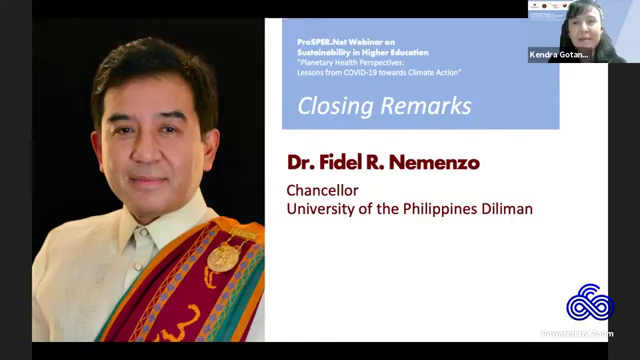
“We need to think about transformations that will benefit not just our own campuses, but the rest of our communities and the entire planet.”
This was UP Diliman (UPD) Chancellor Fidel R. Nemenzo’s message as he closed the webinar, ProsPER.Net on Sustainability in Higher Education 2021, on Oct. 22.
Reflecting on the role of higher education institutions (HEIs) on sustainability, and on the lessons learned from the pandemic, Nemenzo said the academic community needs to do research to advance the understanding of environmental issues and promote sustainable living as a philosophy and a way of life.
“Our universities need to do research to advance our understanding of environmental issues and inform public policy, and introduce the values of sustainability in our curricula to promote awareness of our world and the consequences of our decisions and ways of doing,” he said.
Nemenzo emphasized the importance of the academic community in creating new mindsets, new ways of looking, and new ways of living.
“We need to train a new generation of graduates who understand the connections between economics and ecology, social science and environment, urban development and planetary health—the kind of people who know that the comforts of living should not be at the expense of our planet,” Nemenzo said.
Presently, human destructive practices, such as the conversion of tropical rainforests into intensive agricultural lands to meet the demand for cooking oil, encroachment into wild habitats for human settlement, and open burning and dumping of waste, still persist.
“These human actions, among many others, contribute to the warming of the earth and are driving changes in the biosphere, water, and climate system at an unprecedented pace. These changes and the impact of our actions multiply and increase in scale, because our world is a complex system of interacting components,” Nemenzo said.
Sustainable living—which can begin in each university campus—may help slow down, if not reverse, the environmental problems including climate change. Collective action has the potential for global impact.
“Practicing and applying the elements of a sustainable campus to the infrastructure (energy, materials, and food), community (governance, investment, and wellness), and learning (curriculum, interpretation, and aesthetics) can be a start,” Nemenzo said.
In addition, “it is evident that we cannot take on this task alone, but rather must open ourselves up to collaboration across the disciplines whether within or outside our institutions, if we want to achieve our goals towards sustainability,” he said.
The webinar, with the theme “Planetary Health Perspectives: Lessons from COVID-19 towards Climate Action,” shared the pandemic experiences of HEIs on how institutions can more effectively lead social and environmental transformations toward a more resilient and healthier planet. It is an event of ProsPER net, a network for the promotion of sustainability in postgraduate research and education. The UPD organized this year’s webinar with Ateneo de Manila University (ADMU), and in collaboration with the United Nations UniversityInstitute for the Advanced Study of Sustainability (UNU-IAS).
